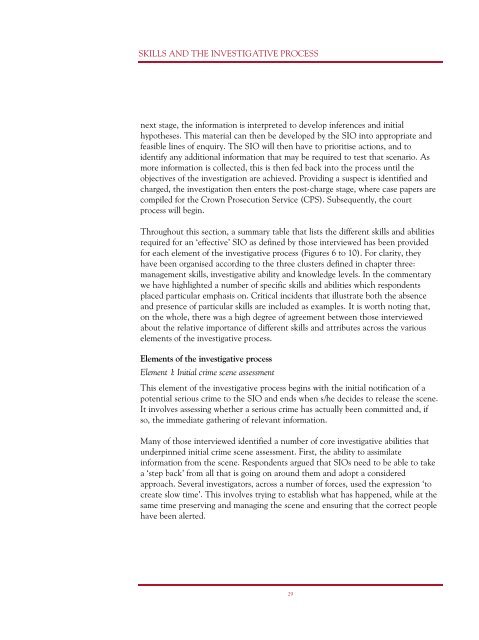Effective Detective
Effective Detective
Effective Detective
- No tags were found...
You also want an ePaper? Increase the reach of your titles
YUMPU automatically turns print PDFs into web optimized ePapers that Google loves.
SKILLS AND THE INVESTIGATIVE PROCESSnext stage, the information is interpreted to develop inferences and initialhypotheses. This material can then be developed by the SIO into appropriate andfeasible lines of enquiry. The SIO will then have to prioritise actions, and toidentify any additional information that may be required to test that scenario. Asmore information is collected, this is then fed back into the process until theobjectives of the investigation are achieved. Providing a suspect is identified andcharged, the investigation then enters the post-charge stage, where case papers arecompiled for the Crown Prosecution Service (CPS). Subsequently, the courtprocess will begin.Throughout this section, a summary table that lists the different skills and abilitiesrequired for an ‘effective’ SIO as defined by those interviewed has been providedfor each element of the investigative process (Figures 6 to 10). For clarity, theyhave been organised according to the three clusters defined in chapter three:management skills, investigative ability and knowledge levels. In the commentarywe have highlighted a number of specific skills and abilities which respondentsplaced particular emphasis on. Critical incidents that illustrate both the absenceand presence of particular skills are included as examples. It is worth noting that,on the whole, there was a high degree of agreement between those interviewedabout the relative importance of different skills and attributes across the variouselements of the investigative process.Elements of the investigative processElement 1: Initial crime scene assessmentThis element of the investigative process begins with the initial notification of apotential serious crime to the SIO and ends when s/he decides to release the scene.It involves assessing whether a serious crime has actually been committed and, ifso, the immediate gathering of relevant information.Many of those interviewed identified a number of core investigative abilities thatunderpinned initial crime scene assessment. First, the ability to assimilateinformation from the scene. Respondents argued that SIOs need to be able to takea ‘step back’ from all that is going on around them and adopt a consideredapproach. Several investigators, across a number of forces, used the expression ‘tocreate slow time’. This involves trying to establish what has happened, while at thesame time preserving and managing the scene and ensuring that the correct peoplehave been alerted.29


